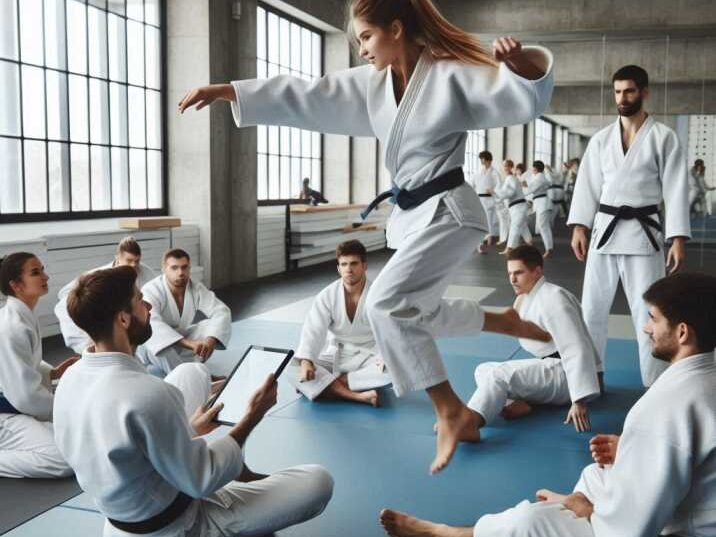Combat sports training requires discipline, focus, and concentration. This talent benefits not only martial arts but also other areas. Broader applications boost concentration in the classroom and other everyday activities. The world of combat sports is a bit intimidating, however, not all are difficult to master. If you’re looking for a less difficult approach to getting started in combat sports, the following article can help you learn the most basic ones.
Introduction
Table of Contents
Combat sports are exciting, empowering, and a great way to stay in shape. However, not all martial arts require years of practice to master. If you’re looking for a combat sport that’s easy to learn, offers practical self-defense, and can be enjoyed by beginners, you’ve come to the right place! This article will explore some of the easiest combat sports for children and adults alike. Whether you’re a student wanting to improve your focus or someone interested in a new hobby, we’ll break down the best options for you.
What Makes a Combat Sport Easy?
Before you get deep into this list of options, it’s essential to comprehend the factors that make the combat sport simple. In general, sports that have simpler moves, fewer techniques to master, and a lesser dependence on strength or flexibility are considered to be easier to master. In addition, sports that offer organized classes with easy-to-follow directions aid in making learning more streamlined.
1. Boxing
Boxing is often seen as one of the easiest combat sports to pick up, especially for beginners. The sport has a straightforward structure that focuses on punches such as jabs, hooks, and uppercuts, which are relatively easy to learn with practice. Unlike some other martial arts, boxing doesn’t require complicated techniques, making it beginner-friendly.

Benefits of Boxing:
- Improves physical fitness: Boxing involves intense conditioning workouts that include cardio, strength training, and stamina-building exercises. This not only helps improve overall health but also makes you stronger and fitter.
- Enhances hand-eye coordination: Boxing requires quick reflexes, timing, and precision. Learning to land punches while avoiding an opponent’s strikes sharpens coordination between your hands and eyes, which is useful in many sports and daily activities.
- Teaches self-defense skills: Boxing helps develop fundamental self-defense skills. Knowing how to block, dodge, and deliver punches can be crucial in protecting oneself in dangerous situations.
- Builds confidence: Boxing training pushes you to face physical and mental challenges. Overcoming these challenges leads to improved self-confidence, especially as you see progress in your skills.
2. Judo
Judo, a martial art from Japan, is also considered easy to learn because it focuses on throws and takedowns rather than punches or kicks. The core principle of judo is to use your opponent’s strength against them, which makes it accessible for individuals of all body types and fitness levels.
Benefits of Judo:
- Teaches balance and body control: Judo techniques require a strong sense of balance and the ability to control your movements precisely. Practicing judo helps develop these skills, which can be useful in other physical activities.
- Builds discipline: Judo classes emphasize discipline, respect for others, and perseverance. This makes judo an excellent sport for children and adults who want to improve their focus and self-control.
- Great for self-defense: Unlike sports that focus on striking, judo is centered around neutralizing an opponent by controlling or subduing them without causing serious injury. This makes it an effective and safe self-defense option.

3. Karate
Karate is one of the most popular martial arts globally, known for its focus on basic strikes like punches and kicks, as well as defensive moves. It is often considered an excellent beginner martial art because of its structured learning process and emphasis on respect, self-control, and discipline. Karate is suitable for both children and adults.
Benefits of Karate:
- Improves focus and discipline: Karate teaches students to concentrate on their techniques, maintain good posture, and follow instructions carefully. This skill of focusing translates well to academic settings, helping students improve their attention spans and discipline in school.
- Builds strength and flexibility: Regular karate practice involves various strikes, kicks, and blocks, which strengthen muscles and increase flexibility. Karate also improves agility and balance over time.
- Teaches self-defense and builds confidence: Karate techniques are highly effective for self-defense. As students progress and learn new skills, they gain confidence not just in their martial arts ability, but also in other areas of life.
4. Muay Thai
Though it might appear intense at first glance, Muay Thai, also known as Thai boxing, is one of the easiest combat sports to learn. What makes it accessible for newcomers is its simple usage of your body as an instrument. Muay Thai uses fists, elbows, knees, and shins for striking, turning it into a full-body workout. This makes it an excellent way to boost fitness while learning a powerful martial art.
Benefits of Muay Thai:
- Increases stamina and cardiovascular health: Muay Thai training is a continuous motion of throwing punches, kicks, and elbows – keeping your heart rate up. This makes it fantastic for improving cardiovascular health and endurance.
- Builds full-body strength: In contrast to combat sports, which focus on specific regions, Muay Thai works out the whole body. Starting with your legs, all the way to your upper and core muscles each strike is a challenge to several muscles and increases the overall strength.
- Enhances coordination and reflexes: Muay Thai requires quick responses and precise movements. Whether you’re blocking an opponent’s attack or delivering a well-timed kick, training helps sharpen your reflexes and coordination.
5. Brazilian Jiu-Jitsu (BJJ)
Brazilian Jiu-Jitsu (BJJ) is a ground-fighting martial art that emphasizes grappling and submission techniques. Unlike striking-based combat sports, BJJ is about outsmarting your opponent using leverage, positioning, and technique rather than brute strength or speed. This makes it a great choice for beginners, especially for those who prefer a non-striking sport.
Benefits of Brazilian Jiu-Jitsu:
- Emphasizes technique over strength: In BJJ, a smaller or weaker person can overcome a stronger opponent by using the right technique and leverage. This focus on skill development makes it ideal for beginners who want to improve without relying on power.
- Builds problem-solving skills: BJJ is often compared to “human chess.” On the mat, you have to think several moves ahead, constantly adjusting to your opponent’s actions. This helps develop strong problem-solving abilities, as well as adaptability.
- Excellent for self-defense: BJJ is one of the most effective martial arts for self-defense because it teaches you how to defend yourself even if you are on the ground. The ability to control and submit an opponent without relying on striking makes it valuable for real-life situations.
How to Choose the Right Combat Sport?
Choosing the right combat sport can depend on several personal factors. It’s important to consider what matches your interests, goals, and lifestyle.
Factors to Consider:
- Physical fitness: If you’re looking for a way to improve your physical fitness, combat sports like Muay Thai and boxing are great options, as they offer full-body workouts. On the other hand, Brazilian Jiu-Jitsu (BJJ) or judo may be better if you prefer to focus on technique rather than cardio-heavy activities.
- Learning style: Do you thrive in structured environments, or do you prefer to learn at your own pace? Martial arts like karate and judo often have more structured classes, with belts and ranking systems, while boxing and Muay Thai may offer more flexible training environments.
- Type of combat: Some people are more drawn to striking sports like boxing or Muay Thai, where you use your hands, elbows, knees, and feet. Others might prefer grappling sports like judo and Brazilian Jiu-Jitsu, which focus on throws, takedowns, and submissions. Your preference for striking or grappling will help determine which sport is best suited for you.
Table of Information on Easiest Combat Sports
| Combat Sport | Type (Striking or Grappling) | Benefits | Best For |
|---|---|---|---|
| Boxing | Striking | Hand-eye coordination, fitness | Beginners, all ages |
| Judo | Grappling | Balance, discipline, self-defense | All ages |
| Karate | Striking | Focus, flexibility, discipline | Children, beginners |
| Muay Thai | Striking | Stamina, full-body strength | Fitness lovers |
| Brazilian Jiu-Jitsu | Grappling | Technique, problem-solving | Non-striking fans |
Conclusion
In conclusion, combat sports offer a range of benefits, from fitness to discipline, and learning one doesn’t have to be difficult. Whether you choose boxing, karate, or Brazilian Jiu-Jitsu, each sport is beginner-friendly and provides a unique set of skills. Most importantly, training in combat sports can teach you focus, and self-defense, and build confidence, making it easier to succeed in school, sports, or any other activities.
FAQs
- What is the easiest combat sport to learn?
Boxing is often considered the easiest because of its simple techniques and straightforward rules. - Can children learn these combat sports?
Yes, many combat sports like karate and judo are specifically designed for children. - Which combat sport is best for fitness?
Muay Thai is excellent for improving overall fitness due to its high-intensity full-body workouts. - Is Brazilian Jiu-Jitsu good for beginners?
Yes, BJJ is perfect for beginners, especially those who prefer non-striking sports. - What combat sport improves focus the most?
Karate and boxing are excellent for enhancing focus, discipline, and mental clarity.


